UPSC Exam > UPSC Notes > Current Affairs & Hindu Analysis: Daily, Weekly & Monthly > The Hindu Editorial Analysis- 6th April 2024
The Hindu Editorial Analysis- 6th April 2024 | Current Affairs & Hindu Analysis: Daily, Weekly & Monthly - UPSC PDF Download
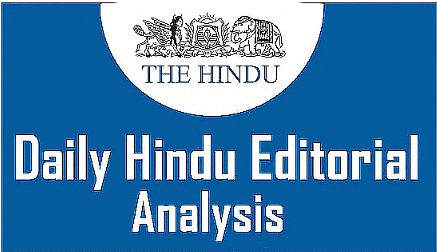
Parliaments past, a mirror to changing dynamics
Why in News?
In an atypical departure from its usual five-day working schedule, the 17th Lok Sabha (2019-2024) concluded its proceedings on a Saturday, marking the culmination of a journey with unexpected twists and turns. Echoing a historical parallel, the previous Lok Sabha too also concluded with an extended parliamentary session.
Key Achievements of 17th Lok Sabha
- The 17th Lok Sabha held a total of 274 sessions, lasting for 1,354 hours.
- Achieved a commendable work productivity rate of approximately 97%.
Key Concerns in the Functioning of 17th Lok Sabha
- The government's tendency to rush bill passages without adequate debate.
- Impact on democratic functioning due to chaotic bill passages.
Implications of Decline in Functioning of Lok Sabha
- Decrease in the effectiveness of democratic processes.
- Potential for flawed decision-making affecting the populace.
- Key Bills Passed: A total of 179 bills, excluding Finance and Appropriation Bills, were successfully passed during the period. Among these, the Ministries of Finance and Home Affairs led the passage with 15% each, followed by Law and Justice (9%), and Health and Family Welfare (9%).
- The Women's Reservation Bill, 2023
- The J&K Reorganisation Bill, 2019
- The Appointment of CEC Bill, 2023
- Three Labour Codes
- The Digital Data Protection Bill, 2023
- Three Farm laws (which were later repealed)
- Three Bills replacing the IPC, 1860, the CrPC, 1973, and the Indian Evidence Act, 1872
- Private Member Bills: The Lok Sabha saw the introduction of 729 Private Members' Bills during the mentioned period.
- Papers Laid by Ministers: Ministers laid a total of 26,750 papers during the 17th Lok Sabha.
- Parliamentary Standing Committees: These committees presented 691 reports, with over 69% of their recommendations being accepted by the government.
- Use of Digital Technology: The 17th Lok Sabha emphasized the extensive use of digital technology in parliamentary operations, striving for a paperless office environment. Currently, over 97% of question notices are submitted through electronic means.
- New Parliamentary Building: In a historic move on September 19, 2023, the Parliament transitioned to a new complex, shifting from the circular building to a triangular structure featuring a lion capitol on Central Vista.
- Starred and Unstarred Questions: During the 17th Lok Sabha period, 4,663 starred questions were listed, of which 1,116 were orally answered. Additionally, 55,889 unstarred questions received written responses in the House.
- Presently, the majority of question notifications, exceeding 97%, are transmitted through digital means.
- In a significant transition, the Parliament relocated to a new facility on September 19, 2023, moving from the renowned circular structure to a triangular edifice adorned with a lion capital on the Central Vista, serving as the new epicenter of India's democratic operations.
- Starred and Unstarred Questions: Throughout the 17th Lok Sabha tenure, 4,663 starred questions were tabled, with 1,116 receiving verbal responses. Simultaneously, 55,889 unstarred inquiries were raised, eliciting written replies during the proceedings.
Key Concerns in the Functioning of 17th Lok Sabha
- Minimal Sittings Compared to Previous Full-term Lok Sabhas: The 17th Lok Sabha conducted a total of 274 sessions. This count falls short of several preceding Lok Sabhas which disbanded prematurely before completing a five-year term. Notably, 11 out of the 15 sessions in this Lok Sabha were adjourned prematurely.
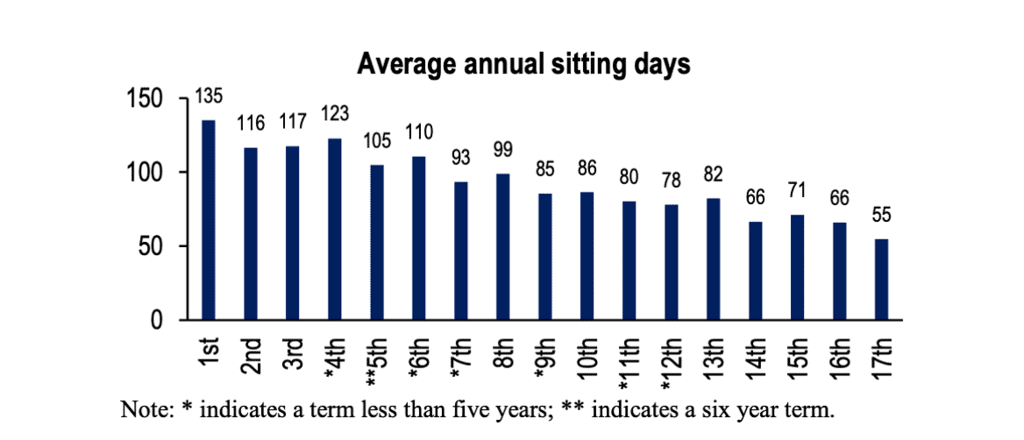 Key Points Regarding Lok Sabha Proceedings:
Key Points Regarding Lok Sabha Proceedings:
- Article 93 of the Constitution mandates the Lok Sabha to elect a Speaker and a Deputy Speaker promptly. Notably, the Deputy Speaker was not elected throughout this Lok Sabha's term, a first in its history.
- In the 17th Lok Sabha, a significant 58% of introduced Bills were swiftly passed within two weeks of their introduction. Remarkably, the J&K Reorganisation Bill, 2019, and the Women's Reservation Bill, 2023, were both passed within just two days of being introduced.
- An alarming trend was observed as 35% of Bills were passed with less than an hour of discussion in the Lok Sabha, indicating a potential lack of thorough deliberation and scrutiny.
Legislative Process Overview
- The J&K Reorganisation Bill, 2019, and the Women's Reservation Bill, 2023 were swiftly approved within two days of their proposal.
- A concerning trend emerged as 35% of Bills were sanctioned in the Lok Sabha after less than an hour of deliberation.
Committee Referrals Analysis
- Less than 20% of Bills underwent thorough examination by Committees, with only 16% being subjected to detailed scrutiny.
- This percentage marks a decline compared to the preceding three Lok Sabhas.
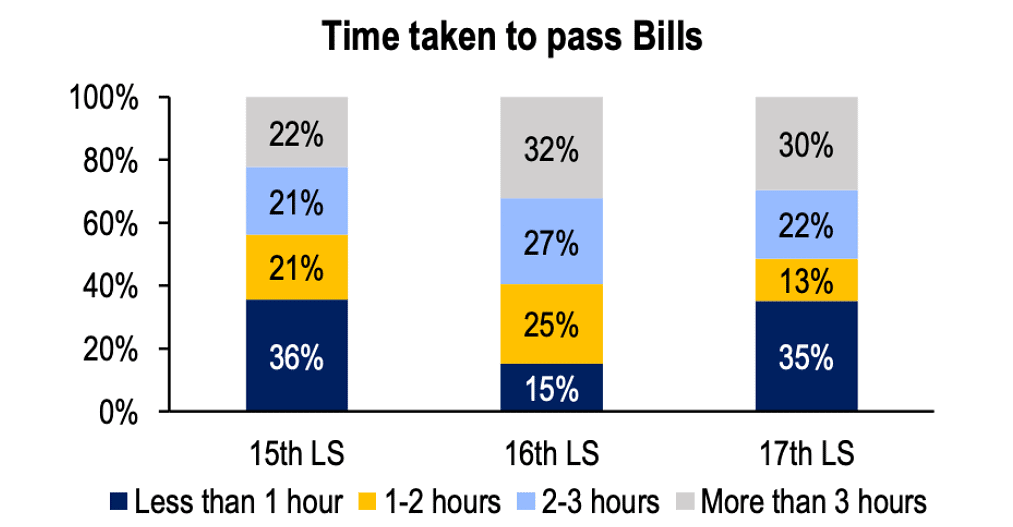
Insight into Bill Passage
- Key bills like the J&K Reorganisation Bill, 2019, and the Women's Reservation Bill, 2023, were swiftly processed within two days of being introduced.
- A concerning statistic reveals that 35% of Bills were greenlit in the Lok Sabha with less than an hour of substantive discussion.
Examination by Committees
- A meager proportion, less than 20% of Bills, were subjected to in-depth review by Committees, with only 16% undergoing detailed scrutiny.
- This figure indicates a decline compared to the examination rates in the previous three Lok Sabhas.
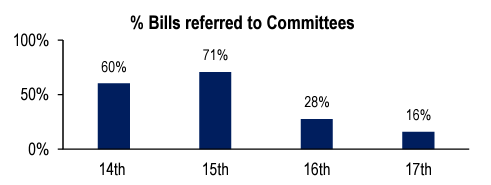
- Few Private Members' Bills and Resolutions Discussed: 729 Private Members' Bills (PMBs) were introduced in the 17th Lok Sabha, which is a higher number compared to all previous Lok Sabhas, except the 16th. However, only two PMBs were actually discussed.
- Lesser Time Spent On Budget Discussions: Over the years, there has been a decrease in the time allocated for budget discussions in the Lok Sabha. Between 2019 and 2023, approximately 80% of the budget was approved without any discussion taking place. Shockingly, in 2023, the entire budget was passed without any deliberation.
- Major Security Breach: On the 13th of December, 2023, a significant security breach occurred in the Lok Sabha. Coinciding with the anniversary of the Parliament attack, two individuals breached security by entering the Lok Sabha chamber from the public gallery during Zero Hour. They proceeded to release yellow smoke from canisters and shouted slogans, causing a disturbance.
- Increased Criminalization: The rising trend of criminalization in Indian politics highlights the growing presence and influence of individuals with criminal backgrounds in the political sphere. According to the Association for Democratic Reforms (ADR), 43% of the elected Members of Parliament in the 17th Lok Sabha had pending criminal cases against them.
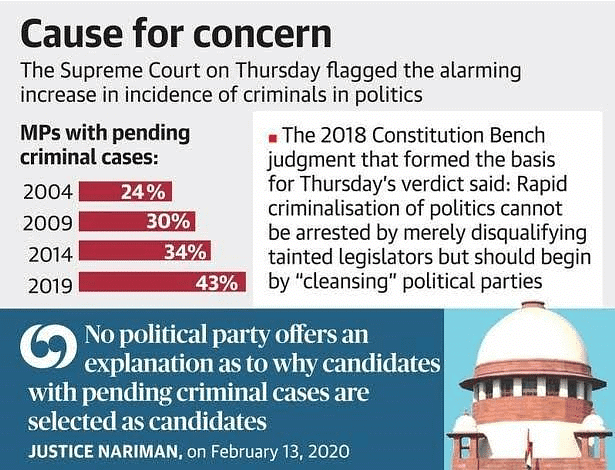
What are the Consequences of Reduced Effectiveness in Lok Sabha?
- Lack of efficient decision-making processes due to disruptions and frequent adjournments.
- Diminished accountability of elected representatives towards the public.
- Decreased legislative productivity leading to delayed or ineffective policy implementations.
- Erosion of public trust in democratic institutions.
Challenges of Diminished Parliamentary Engagement
- Undermining Institutional Credibility: When the Lok Sabha fails to fulfill its legislative duties effectively, it risks eroding the trust and respect people have for parliamentary institutions. This erosion can have negative implications for the country's democratic foundation and the perceived legitimacy of elected representatives.
- Decreased Accountability: The reduction in the number of parliamentary sessions and the limited involvement of lawmakers result in less oversight of government activities. This lack of scrutiny can weaken accountability since there are fewer chances for legislators to inquire about governmental decisions, policies, and spending.
- Weakened Representation: Active participation in parliament is vital for representing the diverse interests of the population. When engagement declines, certain voices may be excluded, leading to policymaking that does not adequately cater to the needs of all citizens.
- Impaired Policy Quality: Meaningful parliamentary involvement usually involves thorough discussions, debates, and cooperation among legislators. A decrease in engagement levels can compromise the quality of policymaking due to inadequate input, review, and analysis.
- Stifled Innovation: Parliamentary interactions often provide a platform for proposing and advancing creative solutions to complex problems. A drop in engagement may impede the exchange of ideas and the development of innovative policy approaches, hindering progress and adaptation to evolving circumstances.
- Perpetuating Corruption: The connection between criminal activities and politics sustains corruption, as politicians with criminal backgrounds might resort to bribery, extortion, and other illegal practices to maintain their authority. This undermines anti-corruption efforts and the promotion of transparency and integrity in governance.
The Nexus Between Crime and Politics
- The connection between criminal activities and political spheres often leads to increased corruption. Politicians with criminal histories may resort to bribery, extortion, and other illegal practices to uphold their authority and impact.
- Such misconduct hampers anti-corruption endeavors and the establishment of transparent and ethical governance practices.
What is the Recommended Course of Action?
- Implement stringent regulations to prevent individuals with criminal backgrounds from holding public office.
- Enhance oversight mechanisms to monitor and deter illicit activities within political realms.
- Foster a culture of accountability and integrity to discourage corrupt behavior among politicians.
- Promote awareness among the public regarding the detrimental effects of the crime-politics nexus on society.
Conclusion
India needs to adopt a comprehensive strategy for political and economic reform, encompassing enhancements in parliamentary, political party, electoral, and judicial systems through meticulous discussion and consensus-building. This collaborative endeavor is vital for improving the functioning of democracy within the nation.
The document The Hindu Editorial Analysis- 6th April 2024 | Current Affairs & Hindu Analysis: Daily, Weekly & Monthly - UPSC is a part of the UPSC Course Current Affairs & Hindu Analysis: Daily, Weekly & Monthly.
All you need of UPSC at this link: UPSC
|
38 videos|5293 docs|1118 tests
|
Related Searches
















